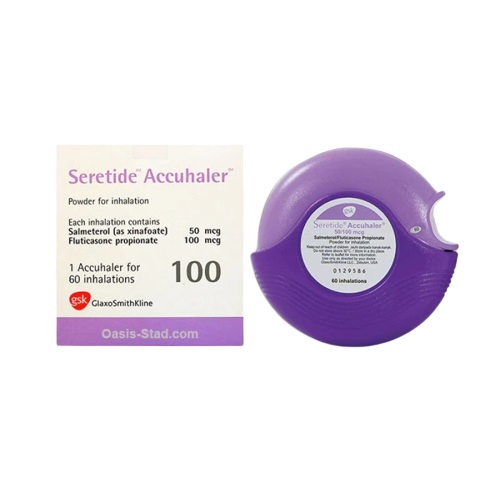Seretide Diskus, a combination inhaler medication, has emerged as a cornerstone in the management of these conditions. In this comprehensive guide, we delve into the nuances of Seretide Diskus, exploring its mechanism of action, indications, dosage recommendations, and the benefits it offers to those living with asthma and COPD.
Understanding Asthma and COPD:
Asthma and COPD are chronic respiratory conditions characterized by airflow obstruction and inflammation of the airways, albeit with distinct underlying mechanisms. Asthma typically involves reversible airflow limitation and airway hyperresponsiveness, often triggered by allergens, exercise, or environmental factors. On the other hand, COPD encompasses conditions such as chronic bronchitis and emphysema, characterized by progressive and irreversible airflow limitation, primarily attributed to smoking and environmental pollutants.
The Role of Seretide Diskus:
Seretide Diskus is a combination medication comprising two active ingredients: fluticasone propionate, a corticosteroid that reduces airway inflammation, and salmeterol, a long-acting beta-agonist (LABA) that helps to relax and open the airways. This dual-action formulation addresses both the inflammatory component and the bronchoconstriction associated with asthma and COPD, thereby providing comprehensive symptom relief and improving respiratory function.
Indications and Dosage Recommendations:
Seretide Diskus is indicated for the maintenance treatment of asthma and COPD in adults and adolescents aged 12 years and older. The recommended dosage regimen may vary depending on the severity of the condition and individual patient response. For asthma, the typical starting dose is one inhalation of Seretide Diskus 50/100 or 50/250 twice daily, with adjustments made based on symptom control and lung function. In COPD, the recommended dose is one inhalation of Seretide Diskus 50/500 twice daily. It's crucial for patients to adhere to the prescribed dosage regimen and consult their healthcare provider for personalized guidance.
Benefits of Seretide Diskus:
- Improved Symptom Control: By targeting both inflammation and bronchoconstriction, Seretide Diskus helps to alleviate symptoms such as wheezing, shortness of breath, and coughing, thereby enhancing overall respiratory function and quality of life.
- Prevention of Exacerbations: The anti-inflammatory properties of fluticasone propionate in Seretide Diskus contribute to reducing the frequency and severity of asthma and COPD exacerbations, minimizing the need for rescue medications and emergency healthcare utilization.
- Enhanced Lung Function: Salmeterol, the LABA component of Seretide Diskus, promotes bronchodilation and improves airflow, leading to enhanced lung function and exercise tolerance in individuals with asthma and COPD.
- Convenient Administration: Seretide Diskus offers a user-friendly inhalation device that delivers precise doses of medication, making it easy for patients to incorporate into their daily routine and adhere to long-term treatment plans.
Safety Considerations:
While Seretide Diskus is generally well-tolerated, it's essential for patients to be aware of potential side effects and safety considerations associated with its use. Common side effects may include throat irritation, hoarseness, headache, and oral candidiasis (thrush). Additionally, the long-term use of corticosteroids such as fluticasone propionate may be associated with systemic effects, including adrenal suppression, bone mineral density loss, and cataract formation. Patients should be advised to rinse their mouth with water after each use to minimize the risk of oral candidiasis and practice proper inhaler technique to ensure optimal drug delivery to the lungs.
Conclusion:
Seretide Diskus represents a valuable therapeutic option for individuals managing asthma and COPD, offering comprehensive symptom relief, improved lung function, and prevention of exacerbations. By harnessing the synergistic effects of fluticasone propionate and salmeterol, Seretide Diskus empowers patients to take control of their respiratory health and lead active, fulfilling lives. However, it's imperative for patients to work closely with their healthcare providers, adhere to prescribed dosage regimens, and remain vigilant about potential side effects to maximize the benefits of this medication.
In summary, Seretide Diskus stands as a testament to the remarkable advancements in respiratory medicine, providing a multifaceted approach to managing asthma and COPD and improving the well-being of millions worldwide.





Comments